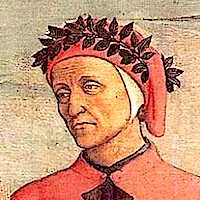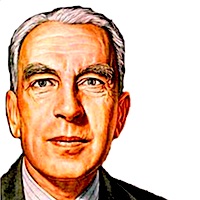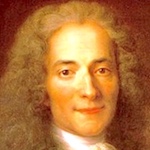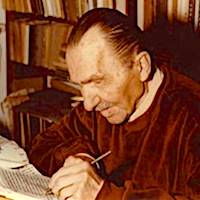

Tao Te Ching

Dante
(Durante degli Alighieri)
1265 – 1321 CE
Dante fell madly in love with Beatrice when she was only 8 years old and described his passion as “a God stronger than I who came and ruled me.” This unrequited love lasted through her marriage to another, her death at only 24, and throughout Dante’s life. It inspired his great work, The Divine Comedy now considered the greatest book in the Italian language and most important Middle Ages poem. Dante’s politics led to his exile, loss of citizenship and property, 15 years of poverty-stricken wandering, and a decree for him to be arrested and burned alive. His vivid descriptions of hell were based on personal experience and his writings saved him from the intensity of his suffering as it helped establish modern literature. Florence apologized for his exile 700 years later.
Lineages
Christian Poets Roman / Italian
Eras
Chinese
Yuan Dynasty 元朝 (1271 – 1368 CE)Unlisted Sources
Divine Comedy
Divine Comedy (1320)
Divine Comedy (1321)
Letters
Monarchy, 1309
The Convivio
The Divine Comedy
Quotes by Dante (26 quotes)
“Pride, envy, avarice—these are the sparks that set on fire the hearts of a all men.”
from Divine Comedy
Comments: Click to comment
“What is liberty but the unhampered translation of will into act?”
from Letters
Comments: Click to comment
“Lawful gains rarely come to the good because they require much anxious care and the good—their care directed to weightier matters—rarely have time or motivation for that much care.”
from The Convivio
Comments: Click to comment
“What else imperils and slays cities, countries, and individuals as much as the amassing of wealth which cannot be gained without harming others?”
Comments: Click to comment
“Remember tonight... for it is the beginning of always.”
Comments: Click to comment
“My course is set for an uncharted sea.”
Comments: Click to comment
“My course is set for an uncharted sea.”
Comments: Click to comment
“Do not be afraid; our fate cannot be taken from us; it is a gift.”
Comments: Click to comment
“The wisest are the most annoyed at the loss of time.”
Comments: Click to comment
“Consider your origin. You were not formed to live like brutes but to follow virtue and knowledge.”
Comments: Click to comment
“O human race, born to fly upward, wherefore at a little wind dost thou so fall?”
Comments: Click to comment
“Those who stay asleep will watch their life drift past them like a dream, and the traces of their memory will fade from time like smoke in air, or ripples on a stream.”
from Divine Comedy
Comments: Click to comment
“Heaven wheels above you, displaying to you her eternal glories, and still your eyes are on the ground.”
Comments: Click to comment
“Aristotle: first among all thinkers and master of those who know.”
from Divine Comedy
Comments: Click to comment
“These are the soulless whose lives included neither blame nor praise.”
from Divine Comedy
Comments: Click to comment
“Follow your star, for if in all of the sweet life I saw one truth shine clearly, you cannot miss your glorious arrival.”
from Divine Comedy
Comments: Click to comment
“Mankind is at its best when it is most free and the basic principle is freedom of choice—a saying many have on their lips but few in their mind.”
from Monarchy, 1309
Comments: Click to comment
“You are like those who pass through the night pulling a light behind them. It doesn't profit themselves but makes those who follow them wise.”
from Divine Comedy (1320)
Comments: Click to comment
“O glory of the Latin race... Our divine poet....by whom our language showed forth all its power... of the other poets honor and light... You are my guide, you are my lord and teacher”
from The Divine Comedy
Comments: Click to comment
“Homer is pre-eminent among poets, for he alone combined dramatic form with excellence of imitation, so he too first laid down the main lines of comedy, by dramatizing the ludicrous instead of writing personal satire.”
from Divine Comedy (1321)
Comments: Click to comment
“a 'saved soul' who was worthy of so much reverence that never a son owed his father more”
Comments: Click to comment
Quotes about Dante (5 quotes)

“What Dante achieves at last is sublimity. And because he loved order as well as liberty, and bound his passion and vision into form, he achieved a poem of such sculptured power that no man since has equaled it. The secret of his character was a flaming intensity and all Europe was inspired by his battle and his art, by his story of a proud exile who had gone to hell, and had returned, and had never smiled again.”
Comments: Click to comment

“Dante, though as a poet he was a great innovator, was, as a thinker, somewhat behind the times. His thought is interesting but it was not influential, and was hopelessly out of date.”
Comments: Click to comment

“Dante did not accomplish his life-work until he had been driven to withdraw from his native city... in losing his birthright in Florence, Dante was to win the citizenship of the world; for in exile the genius which had been crossed in politics after being crossed in love found its life-work in creating the Divina Commedia.”
Comments: Click to comment

“Dante was a madman, and his work is a monstrosity. He has many commentators, and therefore cannot be understood. His reputation will go on increasing, for no one ever reads him.”
Comments: Click to comment

“I always had a book in my hand, sometimes Dante, sometimes Homer. As I read the immortal verses, I felt that man could become immortal and that the world's heterogeneous surfae of houses, people, joys, insults—the incoherent chaos we call life—was capable of uniting into harmony.”
Comments: Click to comment
Comments (0)